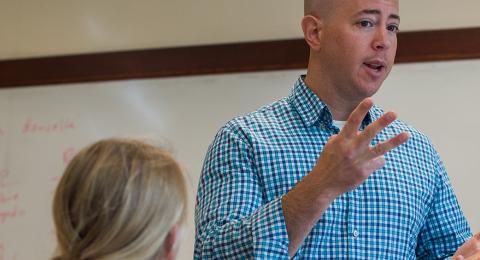The Spanish major at UNH will help you become fluent in Spanish while exploring linguistics, literature, and Spanish or Latin American culture. It prepares students for global careers where Spanish is essential, as the second most spoken language in the world today. Many students pursue double majors in fields like business, linguistics, or international affairs. Study abroad opportunities in Granada, Spain, and Costa Rica are key highlights. The program also offers extracurricular activities throughout the year to enhance learning and cultural engagement.
What is Spanish?
Spanish is the second most spoken language in the world today, and the second language of the United States. In this degree program, you’ll gain fluency in Spanish while also developing an appreciation for linguistics, Spanish literature, and Spanish or Latin American civilization and culture. You’ll be prepared to live and work in a world community where Spanish is important for both personal and professional reasons. Many students in the program consider a double or dual major in a field such as business administration, linguistics, social work or international affairs.
Why study Spanish at UNH?
Study abroad opportunities in Granada, Spain, and Costa Rica, are among the many highlights of the Spanish program at UNH. Our Latin American studies minor is another way to enhance your studies. Throughout the academic year, you’ll have opportunities to participate in extracurricular activities that complement your studies.
Potential careers
- Business leader
- Communications director
- Community advocate
- Diplomat
- Foreign service officer
- International lawyer
- Interpreter
- Journalist
- Social services case worker
- Spanish teacher
- Textbook author
- Tour guide
- Translator
Curriculum & Requirements
When you major in Spanish you are opening your opportunities to a variety of fields in which proficiency in the Spanish language and knowledge of Hispanic cultures are desirable or required. Such fields might include international relations, business administration, government, social service and communications. In addition, students can prepare to teach Spanish at the elementary and secondary level and in bilingual education programs through UNH’s MAT in Secondary Education with a certification in World Languages. The undergraduate major also provides a basis for graduate study in preparation for scholarly research and teaching at the college level. When combined with coursework or a dual major in other disciplines, the major prepares students for work in Spanish-speaking areas of the world as well as in bilingual regions of the United States.
Sample Degree Plan
This sample degree plan serves as a general guide; students collaborate with their academic advisor to develop a personalized degree plan to meet their academic goals and program requirements.
| First Year | ||
|---|---|---|
| Fall | Credits | |
| ENGL 401 | First-Year Writing | 4 |
| Language Major Course | 4 | |
| Discovery Course | 4 | |
| Discovery Course | 4 | |
| First Year Seminar | 1 | |
| Credits | 17 | |
| Spring | ||
| Language Major Course | 4 | |
| Discovery Course | 4 | |
| Major/Minor/Discovery Course | 4 | |
| Major/Minor/Discovery Course | 4 | |
| Credits | 16 | |
| Second Year | ||
| Fall | ||
| Language Major Course | 4 | |
| Discovery Course | 4 | |
| Major/Minor/Discovery Course | 4 | |
| Major/Minor/Discovery Course | 4 | |
| Credits | 16 | |
| Spring | ||
| Language Major Course | 4 | |
| Discovery Course | 4 | |
| Major/Minor/Discovery Course | 4 | |
| Major/Minor/Discovery Course | 4 | |
| Credits | 16 | |
| Third Year | ||
| Fall | ||
| Language Major Course | 4 | |
| Discovery Course | 4 | |
| Major/Minor/Discovery Course | 4 | |
| Major/Minor/Discovery Course | 4 | |
| Credits | 16 | |
| Spring | ||
| Study Abroad (summer and year-long abroad is also available) | 16 | |
| Credits | 16 | |
| Fourth Year | ||
| Fall | ||
| Language Major Capstone Course | 4 | |
| Major/Minor/Discovery Course | 4 | |
| Major/Minor/Discovery Course | 4 | |
| Major/Minor/Discovery Course | 4 | |
| Credits | 16 | |
| Spring | ||
| Language Major Course | 4 | |
| Major/Minor/Discovery Course | 4 | |
| Major/Minor/Discovery Course | 4 | |
| Major/Minor/Discovery Course | 4 | |
| Credits | 16 | |
| Total Credits | 129 | |
Degree Requirements
All Major, Option and Elective Requirements as indicated.
*Major GPA requirements as indicated.
Major Requirements
All students must complete at least 10 classes (40 credits). All coursework required for the Spanish major must be completed with a grade of C or better.
The required minimum overall GPA for study abroad and the Spanish major coursework is 2.0.
Candidates for a degree must satisfy all of the University Discovery Program requirements in addition to satisfying the requirements of each individual major program. Bachelor of arts candidates must also satisfy the foreign language proficiency requirement.
Spanish majors may use two major-required courses to satisfy two Discovery category requirements.
| Code | Title | Credits |
|---|---|---|
| Requirements | ||
| Language Courses 1 | ||
| Students entering major at a higher language level will replace the language courses with additional electives | ||
SPAN 503 | Intermediate Spanish I | |
SPAN 504 | Intermediate Spanish II | |
SPAN 631 | Advanced Conversation and Composition I | |
SPAN 632 | Advanced Conversation and Composition II | |
| Electives 2 | ||
| Select a minimum of five courses from the following Culture, Linguistics, and Literature category | ||
SPAN 525 | Introduction to Spanish Cultures | |
SPAN 526 | Introduction to Latin American Cultures | |
SPAN 641 | Spanish Language Variation & Change | |
SPAN 645 | Intro to Spanish Linguistics | |
SPAN 647 | Topics in Hispanic Cultural Studies | |
SPAN 648 | The Hispanic World Today | |
SPAN 650 | Hispanic Literature and Popular Culture | |
SPAN 654 | Introduction to Latin American Literature and Thought | |
SPAN 790 | Topics in Second Language Acquisition/Pedagogy/Methodology | |
SPAN 797 | Topics in Hispanic Literary and Cultural Studies | |
SPAN 798 | Topics in Hispanic Linguistics and Cultural Studies | |
SPAN 799 | Senior Honors | |
LLC 540 | Film History | |
LLC 552 | Comparative Literature: Masterpieces of World Literature II | |
LLC 555 | Discover Cuba: An Arts Experience | |
LLC 791 | Methods of Foreign Language Teaching | |
| Capstone 3 | ||
| LLC 790 | World Languages Capstone | 4 |
| Study Abroad | ||
| An approved foreign study experience in a Spanish-speaking country is required, although an approved equivalent high-impact experience may be substituted for study abroad with a compelling justification | ||
- 1
While the major may start counting as early as the Intermediate I level (SPAN 503), those who enter the major at a higher level (SPAN 504, SPAN 631, or SPAN 632) will replace the courses they skip from the four in the intermediate and advanced language category with additional electives in the Culture, Linguistics, and Literature category.
- 2
More electives required if fewer language credits were completed due to proficiency level and placement.
No limit on the number of classes in English allowed. Students taking no classes in the target language in a given semester will be strongly encouraged to enroll in one credit of conversation hour to maintain their language skills, and many of the courses taught in English will allow students the option to (or even require students to) do some work in the target language.- 3
Or approved equivalent 700-level course taken at UNH, approved study abroad equivalent, or approved high-impact experience (such as internship with a robust target language/culture component).
Program Learning Outcomes
Linguistic Proficiency
- Students can demonstrate an Advanced level of proficiency (as defined in ACTFL Proficiency Guidelines) in the target language in speaking, writing, listening and reading.
- Speaking: students are able to handle a variety of communicative tasks. They are able to participate in most informal and formal conversations on topics related to school, home, academic, and other activities. They can also speak about topics related to employment, current events, and matters of public and community interest.
- Writing: students are able to meet work and/or academic writing needs. They demonstrate the ability to narrate, describe and express viewpoints about topics in major time frames with control of aspect.
- Listening and Reading: students are able to understand conventional narrative and descriptive texts (spoken and/or written). They can understand the main facts, tone and style, and supporting details.
- Comprehension: students may often develop understanding primarily from their particular situational and subject-matter knowledge(course materials, contextual knowledges, and study abroad experiences), but each student should be able to extend and expand their comprehension to most areas of specialized and non-specialized materials, especially as that directly relates to any of the student’s other major and minor academic subjects of study.
Intercultural and Transcultural Competence
- Students will demonstrate knowledge and understanding of other cultures, and are able to think critically about and are able to recognize and accept culturally differences, and the uniqueness of other cultures and peoples. By the time they graduate from our program, they will be able to:
- Recognize and describe the historical, social, economic, and political forces that shape society in the various target cultures that they have directly studied (taking into account that they cannot be familiar with all the particular specificities of the 23+ nations of the Spanish-Speaking world).
- Analyze and critique the cultural and social products of the target culture(s)(film, literature, art, popular culture, media, etc.) within their context, including conducting basic research projects.
- On a broader level, each student should be able to begin to question the validity of their own cultural beliefs, behaviors and norms, by contrasting and comparing them with those of the target culture (cross-cultural sensitivity and respect).
- Students should be able to perceive and value cultural diversity and reinterpret the place of the self as an individual culturally situated within the global context of the twenty-first century.
Explore Program Details
-
Senior LecturerSenior Lecturer of SpanishEmail: Lucia.Montas@unh.edu
Spanish placement surveys are required so that students may register for the course appropriate to their skills.
Go to the Placement Survey page and begin your Survey
Spanish Course Placement Guidelines
| Spanish 401-402 | Spanish 403 | Spanish 503 | Spanish 504 | Spanish 631* |
|---|---|---|---|---|
| Elementary Spanish | Intensive Review of Spanish | Intermediate Spanish (I) | Intermediate Spanish (II) | Advanced Spanish Conv./Comp. |
| Intro. to basic language skills | Remedial course for students with limited language skills. | Development of lang. skills, intro. to cultural materials from Spain and Latin America | Continued development of language skills, cultural materials from the Hispanic world, expanded | In-depth study of more complex lang. skills and patterns (incl. grammar, conversation, composition) and cultural material |
| Less than 2 years of HS study of Spanish | 2 years of high school Spanish or significant elapse of time since previous study | 3-4 years high school Spanish or Spanish 402 or 403 with C or better | 4-5 years high school Spanish, or AP score “3” or Spanish 503 with C or better | 5+ years of language study, or AP Spanish score “4” or Spanish 504 with C or better |
| Placement test not req’d | Placement survey assessment by faculty* | Placement survey assessment by faculty | Placement survey assessment by faculty | Placement survey assessment by faculty** |
| You must complete both 401 and 402 to satisfy the BA foreign language requirement; does not satisfy some honor society reqmts. | Does not count toward major/minor, gen. ed. 5, nor for some honor society reqmts. Does not fulfill the BA foreign lang. requirement | Counts toward minor, gen.ed. 5, BA foreign language, & some honor society requirements | Counts toward minor, gen.ed. 5, BA foreign language, & some honor society requirements | Counts toward major, minor, BA foreign language, & some honor society requirements. |
| No credit will be given for this course if student has previously studied 2 or more years of Spanish | Family language heritage, residence in a Spanish-speaking country, or study of another foreign language may be an additional factor in placing into higher Spanish classes. |
*If the years of previous study and the placement survey offer contradictory advice about placement, students may consult a language advisor. However, no student with 4 or more years of previous study should be placed below Spanish 503. Students who qualify for Spanish 504 or 631 based on their placement survey and grades in previous study are to be congratulated and are encouraged to consider majoring or minoring in Spanish.
**Students with extensive background in Spanish, or an AP test score “5”, may be placed into Span 632 (Advanced Conversation and Composition II).
Spanish majors are required to spend at least one semester abroad in a Spanish-speaking country. A full year of academic study abroad is highly recommended. The Spanish Program at UNH offers a study abroad option in Granada, Spain, and a summer program in Costa Rica, both managed by program faculty and administered by the College's Center for Study Abroad. To see other Study Abroad Opportunities that are approved by the University, visit UNH Global Education.
The dual-degree B.A./M.A. program in Spanish in the Department of Languages, Literatures and Cultures offers high-achieving students the opportunity to earn both an undergraduate and a graduate degree during their time at UNH. Qualified students may be accepted into the program late in the first semester of their junior year and begin to take graduate courses in the spring of their senior year. Students graduate with a B.A. upon completion of 128 credits (including all University, College and Program requirements), and then complete graduate work (30 credits) the following year. After only five years of study, students earn both degrees.



















